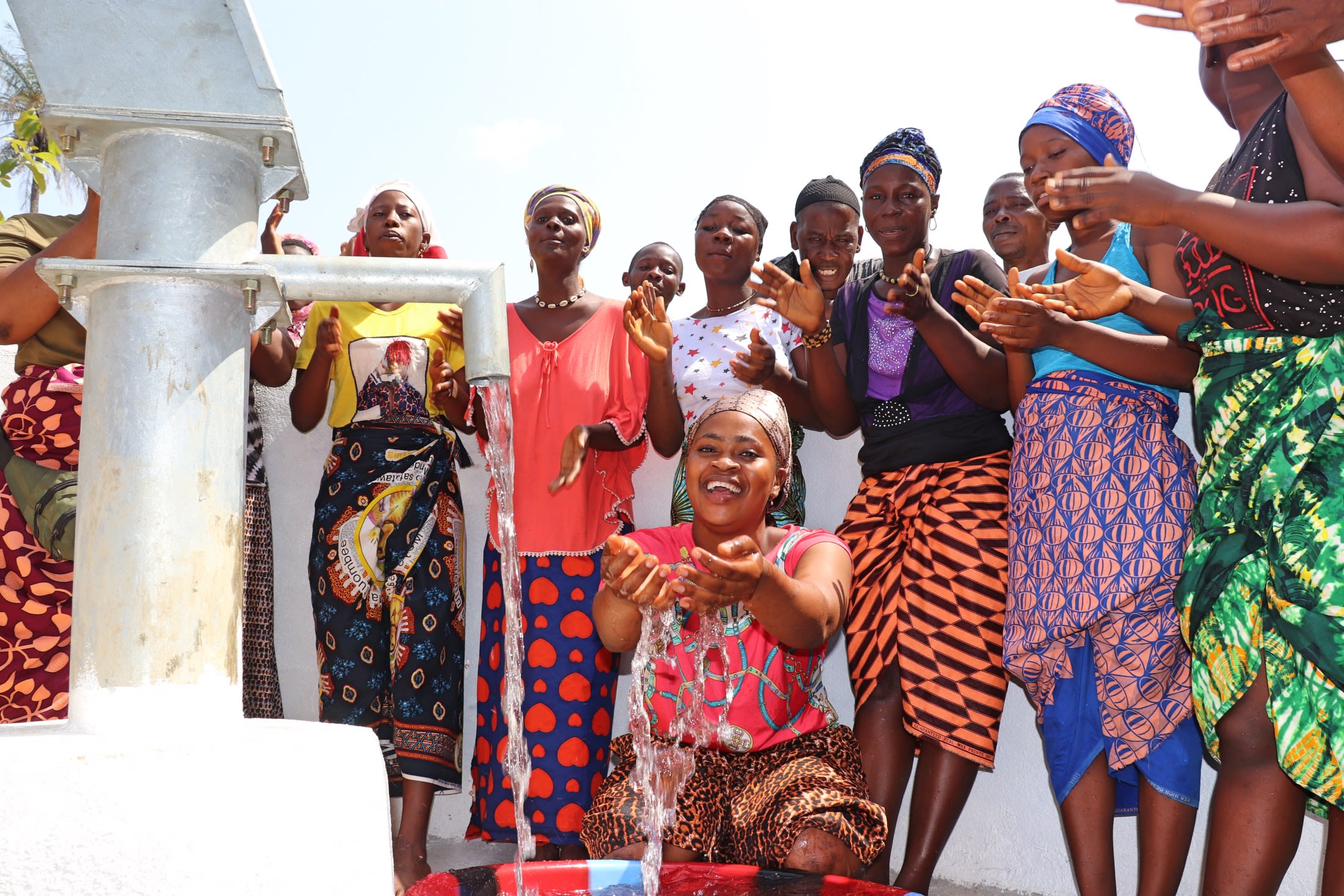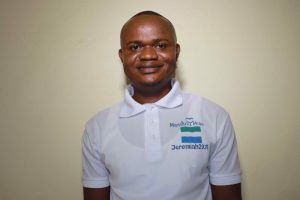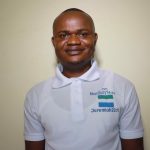February, 2024: Gbaneh Bana Community Well Complete!
We are excited to share that there is now a safe, reliable borehole well at Gbaneh Bana Community. As a result, community members no longer rely on unsafe water to meet their daily needs. We also conducted hygiene and sanitation training, which focused on healthy practices such as handwashing and using latrines.

Community celebrating their new well!
15-year-old Mamusu K. shared, "Before this project was implemented in our community, my mother used to wake me up very early in the morning to search for water and do all my domestic work before I went to school. I had to cross the highway to go and fetch water. The population at the pump in the morning hour was so high. So, I must wait for my turn to fetch the water. By the time I finished all my work, I would be late for school. Most of the time, I was late to school, and I always faced punishment from my teachers, who would ask me to clean all the school latrines."
She continued: "But now that I have this pump very close to my house, nothing will make me late. I have the opportunity to read my books after school, clean my uniform, and get ready for the next day to [go] back to school. I'm so happy for this water point in my community. I want to thank you for providing safe, pure drinking water in our community."

Mamusu celebrating!
"My educational dreams will now come to pass because I have all the chances to focus on my education. I will not face any punishment from my teachers because of lateness; I am now free from their punishment. Really, water is life! You have brought light [back] into our lives. May God bless you all," she concluded.
Adults were just as excited as the children!
"As a mother, this water point will help me greatly to meet my goals. I have water at my doorstep. In the morning, I will do all my domestic work quickly before I go to the market to sell my vegetables," shared trader Mariama Yillah.
"Before this time, I crossed the street to fetch water at the pump. Our children [had to] cross the highway to fetch water. There were many bikes and trucks on the highway, and sometimes accidents took place. Sometimes, I would ask my children not to cross the highway to fetch water. I preferred them to go to the stream to fetch water. Sometimes, there are many people, and I must wait for my turn to fetch water. It took a lot of time. I sometimes went to the market with my vegetables late. If I go late, I will return late to prepare food for my family. But now all this is over, no more eating late, no more going to the market to sell late," said Mariama.

Mariama excited for clean water!"Now that we have reliable, safe drinking water at our doorstep, all our sufferings are over. This water point has impacted me not to cross the street to fetch water. I will no longer go to the stream to fetch water. Thank God for this safe, pure drinking water. All my plans will come to pass now, like having enough rest. I [will] now observe proper hygiene because hygiene without water is not proper hygiene practice," she continued.
We held a dedication ceremony to officially hand over the well to the community members. Several local dignitaries attended the ceremony, including representatives from Port Loko District Council and the Ministry of Water Resource. Each official gave a short speech thanking everyone who contributed to this water project and reminding everyone to take good care of it. Then, Mamusu and Mariama made statements on their community's behalf. There was a celebration during the handing-over ceremony.

Community members celebrate during the dedication.
Everyone was clapping, singing, dancing, and splashing the water to celebrate. They sang songs in Themne and Krio (local languages) to show gratitude for their community's new safe drinking water. Both young and old rejoiced by dancing to the songs they sang because they were now free from water-related struggles in the community.
New Well
The drill team arrived the day before beginning work. They set up camp and unpacked all their tools and supplies to prepare for drilling the next day. The community provided space for the team to store their belongings and meals for the duration of their stay.

The next day, the team began to drill. We reached a final depth of 24 meters. The team did a soil test and forcefully pumped clean water into the well to remove any dirt and debris from the drilling process.
Next, the team bailed the well and flushed it, clearing any debris generated by the drilling process. This well has a static water level of 12 meters. Finally, we tested the yield to ensure the well would provide clean water with minimal effort at the pump.

Yield test.
As the project neared completion, we built a cement platform, walls, and drainage system around the well to seal it from surface-level contaminants. The drainage system helps to redirect runoff and spilled water to help avoid standing water at the well, which can be uncomfortable and unhygienic and a breeding ground for disease-carrying mosquitoes.

Pad constructed and pump installed!
At last, we installed the pump and conducted a water quality test. The test results showed that this was clean water fit for drinking!
New Knowledge
Before conducting any hygiene training, we called and visited the local water user committee to understand the community's challenges and lack of sanitation facilities. We shared the findings from our discussions with the committee members to help them make the necessary adjustments before the training began. For example, we identified households without handwashing stations or ones that may need to repair their latrines. With this information, community members worked together to improve hygiene and sanitation at home.

Handwashing training.
We also invited a nurse from the local clinic to help explain some topics and spread awareness about Sierra Leone's free vaccinations for children under five.
After this preparatory period, we scheduled a time when members from each household using the water point could attend a three-day hygiene and sanitation training. We then dispatched our teams to the agreed-upon location to hold the meeting.
Training topics covered included handwashing and tippy taps, good and bad hygiene habits, teen pregnancy, worms and parasites, proper dental hygiene, menstrual hygiene, proper care of the well's pump, keeping the water clean, the cost recovery system, the importance of using dish racks and clotheslines, the importance of toilets, keeping latrines clean, balanced diets, the diarrhea doll, and disease transmission and prevention (including COVID-19, Ebola, Hepatitis, H.I.V. and AIDS).

Content Warning: Some of the information below may be upsetting for readers. There are references to violence against women and girls.
The training offered lively and informative sessions. One topic discussed was the practice of female genital mutilation (F.G.M.). The community members didn't believe F.G.M. was a dangerous practice, as it had been part of their culture for a long time. Once the nurse shared the risks associated with the practice, the women were able to see the detrimental consequences to girls and how it can affect their physical and mental health for the rest of their lives.
One brave community member shared her experience as a child. She said, "Many years [ago] when I was a teenager, my mum thought I should be involved in the Bondo Society. This was not my wish because I never wanted to be part of this society. I was forced to join the society. I nearly lost my life that day because there was no chloroform or medicine to relieve the pain. From that day, I sustained wounds that are still affecting me today. Even when I gave birth to my first child, it was painful for me. Therefore, I want us to listen to the advice given to us by the nurse. So that our children will no longer suffer the things we [had to] undergo in times past." The rest of the participants clapped for her after she bravely shared her story and took her seat.
Conclusion
This project required a substantial collaboration between our staff, our in-country teams, and the community members. When an issue arises concerning the well, community members are equipped with the necessary skills to rectify the problem and ensure the water point works appropriately. However, if the issue is beyond their capabilities, they can contact their local field officers to assist them.
Also, we will continue to offer them unmatchable support as a part of our monitoring and maintenance program. We walk with each community, problem-solving together when they face challenges with functionality, seasonality, or water quality. Together, all these components help us strive for enduring access to reliable, clean, and safe water for this community.
With your contribution, one more piece has been added to a large puzzle of water projects. In Kenya, Uganda, and Sierra Leone, we're working toward complete coverage. That means reliable, maintained water sources within a 30-minute round trip for each community, household, school, and health center. With this in mind, search through our upcoming projects to see which community you can help next!
Thank you for making all of this possible!








 Borehole Well and Hand Pump
Borehole Well and Hand Pump
 Rehabilitation Project
Rehabilitation Project



























